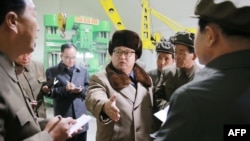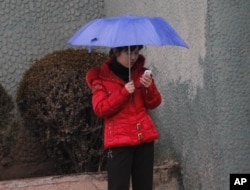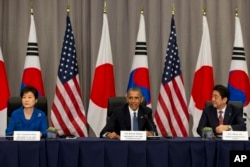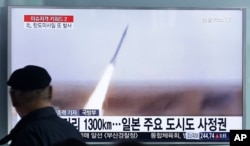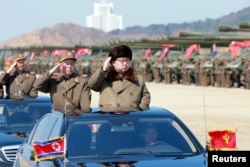North Korea has begun jamming GPS signals in South Korea, affecting some communications and navigation systems, and it also said Friday it is blocking a number of popular websites.
Government officials in Seoul said North Korea should immediately cease its "dangerous and reckless" jamming activity.
Many computer networks and software programs rely on signals sent from the worldwide network of global-positioning satellites. North Korea has been sending signals from ground-based transmitters on frequencies overlapping those used by GPS satellites, so the jamming did not cause any significant, widespread effect.
However, GPS problems were reported by more than 50 airliners flying over the Korean Peninsula, and they evidently affected hundreds of South Korean fishing boats, some of which returned to port as a result.
Authorities in Seoul said the jamming did not hamper ongoing U.S.-South Korean joint military exercises, which have been repeatedly denounced by the communist North.
Separately, North Korea announced officially Friday that it is blocking web pages from YouTube, Facebook, Twitter, the Voice of America and a number of South Korean media sites. It also said gambling and "sex and adult websites" have been blocked. Very few North Koreans have Internet access, but foreign residents and visitors previously have been able to access web pages with almost no overt restrictions.
More than 2 million North Koreans now are estimated to use mobile phones, but with few exceptions access to the Internet is limited to officials, technicians or others who have special permission to use it, usually under close supervision.
The restrictions will make it more difficult for visitors or foreign residents to post real-time information about the reclusive country to the outside world. The announcement added that anyone who tries to hack onto such sites, access them in an "improper" way or distribute "anti-republic data" from them will be subject to punishment under North Korean law. It did not say what the punishment would be.
In another development Friday, North Korea launched another projectile presumed to be a ballistic missile into the sea, according to the South Korean military.
The launch and other North Korean provocations are the latest in a series of threatening acts by Pyongyang, both to protest against the U.S.- South Korean exercises, and in retaliation for tough new sanctions the U.N. imposed on North Korea after its most recent nuclear test.
GPS jamming details
The South Korean Defense Ministry said it has detected disruptive radio waves being transmitted from North Korea’s southwest port city Haeju, and from Mount Kumgang on the east coast.
Seoul has previously accused Pyongyang of jamming activity, especially during a period of heightened tensions in 2012. North Korea was said to be using Russian-made jamming devices at the time, but authorities in Pyongyang said all such allegations were a "sheer fabrication."
North Korea against world
U.S. President Barack Obama, South Korean President Park Geun-hye and Japanese Prime Minister Shinzo Abe met at the Nuclear Security Summit in Washington on Thursday to underscore their united commitment to exert increasing pressure on North Korea to abandon its nuclear program.
The tough new U.N. sanctions imposed in March are meant to cut funding to Pyongyang’s nuclear arms program and to further isolate the Kim Jong Un leadership.
Chinese President Xi Jinping, who met separately with Obama at the Washington summit, said North Korea should resolve this "predicament," as he called it, by returning to international talks and giving up its nuclear weapons in return for security assurances and economic assistance.
The Kim Jong Un government has so far responded to all sides with defiance, launching numerous short and medium range missiles into the sea, ordering further nuclear tests, and threatening nuclear strikes against South Korea and the United States.
Arduous march
This week the Rodong Sinmun, the official newspaper of the ruling Workers’ Party of Korea, warned the North Korean people in an editorial that the sanctions will cause severe economic pain.
“We may have to go on an arduous march, a time when we will again have to eat the roots of grass,” the editorial said.
“Arduous march” refers to the severe North Korean famine that killed over three million people in the 1990s after the Soviet Union collapsed and stopped sending economic aid, and because the communist government grossly mismanaged the country’s economy.
This time the Kim Jong Un leadership wants the people to know who to blame for any hardships to come.
“It claims that the responsibility does not belong to North Korea but it belongs to the U.S. and neighboring countries, which include China this time,” said Kang Chul-hwan, a North Korean defector with the center for North Korea Strategy.
To make up for shortfalls being caused by the sanctions, Pyongyang residents are reportedly being ordered to provide a kilogram of rice to state warehouses every month, and farmers are being forced to "donate" more of their crops to the military.
The North Korean economy has improved under Kim Jong Un in part because of the economic reforms he implemented that allow farmers to sell a portion of the crops they produce, and provides some industries more incentives and control to manage their production and workforce.
But North Korean mineral exports, most of which are banned under the new sanctions, and the export of North Korean labor has also helped improve overall economic conditions, even if the vast majority of earnings have gone to ruling elites and the military.
North Korea has requested nearly half a million tons of food aid from other countries. But only 17,600 tons had been donated by early February.
There is some concern that giving more food aid to North Korea would undermine the sanctions by allowing the leadership to direct more funding to develop nuclear weapons. But there is also concern that the vast majority of North Koreans already living in poverty conditions will suffer the most from these tough new international restrictions.
“If the international community imposes more pressure, then it could lead to a terrible result,” said Kang.
Youmi Kim in Seoul contributed to this report. Some information for this report was provided by AP.




